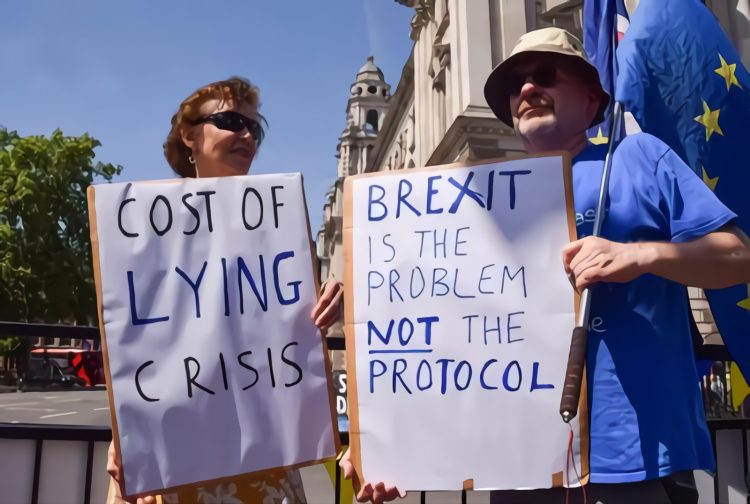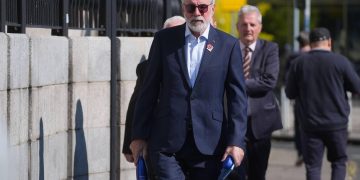The British government intends to alter the ostensibly legally binding treaty governing Northern Ireland’s post-Brexit arrangements.
According to LONDON, the Northern Ireland Protocol, a vital aspect of the EU-UK divorce agreement, is due to new legislation changes.
Brussels has promised retribution, prompting fears on both sides that a trade war will ensue. The US government has also sent a warning to London.There could also be ramifications for the peace agreement that ended decades of sectarianism and for international relations in general.
The action also comes when Northern Ireland is mired in a political impasse. After recent, explosive election results saw pro-unification party Sinn Fein win significant gains in the Assembly, the country’s main unionist party, passionately opposed to the Protocol, has refused to join the statutory power-sharing structure.
The team of Boris Johnson has made many allegations as to why the UK Government should alter the Protocol that Euronews analysed.
‘It’s the EU rules that are to fault.’
British Foreign Secretary Liz Truss outlined intentions for overriding the Protocol to Parliament, citing “substantial costs and paperwork” faced by companies now exporting goods from the United Kingdom to Northern Ireland, some of which have halted trading across the Irish Sea.
Truss also claimed that “onerous restrictions” on food sales had harmed growers. Northern Ireland residents are not eligible for UK tax benefits such as VAT (Value Added Tax) reductions.
Truss blamed the problems on “EU customs procedures which are completely unsuited to goods moving within a country” in a piece for the Daily Telegraph.
Boris Johnson has previously stated that EU customs laws were “designed for vast container ships coming from Shanghai to Rotterdam, not supermarket lorries from Liverpool to Belfast”.
Non-EU goods are subject to checks and limitations when they enter the EU. The Northern Ireland Protocol provides an internal UK trade barrier with Britain instead of a hard land border with Ireland.
The pact keeps the United Kingdom’s territories under EU regulation. Numerous EU rules, including customs, the single market, and VAT, nevertheless apply in Northern Ireland, according to an extensive annexe in the Protocol.
Custom declarations are also required for goods entering from the United Kingdom. Border checks are planned at Northern Irish ports, despite the UK unilaterally extending agreed-upon grace periods, delaying their implementation.
The Prime Minister himself reached the 2019 agreement that resulted in the new arrangements. Both the UK and European parliaments ratified it.
Then, in the autumn, Boris Johnson asserted, incorrectly, that there would be no border checks between Britain and Northern Ireland in either direction. This ran counter to the government’s impact assessment’s extensive checks.
Johnson protested to the Irish Democratic Unionist Party (DUP) convention in November 2018 that Prime Minister Theresa May’s proposal will keep Northern Ireland bound by EU rules, with “regulatory checks and even customs restrictions” between the United Kingdom and its territory.
Johnson stated, “No British Conservative government could or should sign up to anything of the sort.” But within a year, he had done just that.
‘The United Kingdom was hurried into a contract.’
After the accord was finally negotiated in 2019, Boris Johnson lauded a “great new deal” and infamously called it an “oven-ready” post-Brexit arrangement.
But in April this year, former Brexit minister and negotiator Lord David Frost argued EU pressured the UK into agreeing to it at the time. In a speech to the think tank Policy Exchange, Lord Frost said EU_UK bent Brexit opponents on “reversing the referendum result”. He said that Parliament had legislated to block a no-deal Brexit which “massively weakened our negotiating hand,” and the EU had taken advantage.
“As a result, they turned the screws,” Frost said, concluding that arrangements on the need for Northern Irish consent were weaker than they could have been; instead, the EU’s customs rules prevailed. Lord Frost said: “We decided the lesser risk was to push the deal through,” Frost added, “and trust that we could sort out the detail with the EU later.”
Dominic Cummings, Johnson’s estranged former primary aide, put it another way.
“We wriggled through with the best option we could & intended to get the [prime minister] to ditch bits we didn’t like [later on]”, he stated on Twitter in October 2021.”
In a UK government paper published in May 2020, there were no substantive objections regarding the Protocol. Instead, Cabinet minister Michael Gove applauded the accord, repeating his support in December of that year when a follow-up UK-EU agreement included grace periods to give the UK additional time to adapt to the new rules.
Dr Andrew McCormick, a former senior civil servant who was the Northern Ireland Executive’s lead for Brexit, argued in an article for the Constitution Society in April that responsibility for the Brexit divorce settlement and Protocol “lies fairly and squarely with the UK government”
“There is little credibility,” he wrote, “in any argument that the UK government either did not anticipate the implications of what it had agreed or was constrained and unable to choose any other option.”
Dublin has warned Boris Johnson not to use the Northern Ireland Protocol to heal party splits.
According to The National News, The Prime Minister survived a confidence vote, but he still has the challenge of guiding a fractured ruling party.
Boris Johnson has been advised by Ireland’s foreign minister not to tighten his stance on Northern Ireland’s post-Brexit arrangements to shore up support among his fiercely split Conservative Party.
Simon Coveney expressed reservations about the potential of Britain’s struggling prime minister utilising the divisive Northern Ireland Protocol to woo the 41% of Tory MPs who have expressed dissatisfaction with his leadership.
In a late-night vote on Monday, 148 Conservative parliamentarians said they had lost faith in Mr Johnson, while 211 indicated they had not.
The result was a setback for Downing Street, reigniting calls for the prime minister to go over the “partygate affair,” in which he was penalised for violating the Covid-19 lockdown regulations he had imposed.
Mr Coveney said on Tuesday that the Irish government is “concerned” about the impact significant tensions in Britain’s ruling Conservative Party could have across the water.
“If those divisions within the Conservative Party impact on Ireland, because the prime minister or the British government decides to maintain support within the party that they have to take a tougher line on Brexit or the Northern Ireland Protocol, well then obviously divisions in the Conservative Party and the British government impact on Ireland,” Mr Coveney said.
“And, of course, that’s where we have a concern.”
The Northern Ireland Protocol, a vital aspect of Mr Johnson’s post-Brexit agreement with the EU, attempts to prevent a hard border between the UK and the Republic. The section says that Border agents must inspect products arriving in Northern Ireland and being moved to other regions of the UK.
Britain has been at odds with the EU over the Protocol for months, claiming that it is causing problems and needs to be changed. Brussels is adamant in its stance on the subject.
According to RTE Radio, Mr Coveney cautioned Mr Johnson not to use the procedure as a tool to sway lawmakers in his party who have lost faith in him.
“So whoever is the British prime minister, we will work with them, of course, but what we don’t want to see is Ireland being part of a strategy to maintain support within the Conservative Party in the context of hardening a position on the Northern Ireland Protocol,” Mr Coveney said.
The Democratic Unionist Party (DUP) has been blocking efforts to restore regional power-sharing due to its opposition to the deal.
The UK aims to act to overturn elements of the Northern Ireland settlement, according to Foreign Secretary Liz Truss.
Mr Coveney stated that the EU wants “serious” talks and is willing to compromise and be flexible.
He hoped that forthcoming legislation to overturn portions of the Northern Ireland Protocol would not be used as a “price” for Conservative Party support for Mr Johnson.
On Tuesday morning, all eyes were on Number 10 when members of Mr Johnson’s Cabinet gathered for their first meeting since the vote of confidence.
Conclusion
Mr Johnson spoke at the event on “driving reform” and “cutting costs” to focus attention on the future.
He hailed the “huge investment that we are making” before adding: “But it’s not enough to spend money. We have got to spend it wisely.
“We as Conservative ministers have got to make sure at every stage that we are driving reform and value.
“So what I’m going to ask you all to do in each of your departments is make sure that you’re thinking the whole time about cutting the costs of government, about cutting the costs that business has to face and of course cutting the costs that everybody else faces, families up and down the country.”
He also thanked his Cabinet members for supporting him in the vote.





























